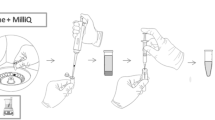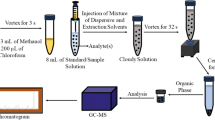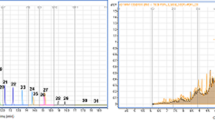Abstract
Antarctica has seen an increase in scientific research and tourism, and anthropogenic activities such as incineration of waste products and fuel combustion for energy and transportation are potential contamination sources to the ecosystem. Polycyclic aromatic hydrocarbons are common products of incomplete combustion of organic compounds and could be among accumulating contaminants in Antarctica. Thus, this study sought to develop a sensitive dispersive liquid–liquid microextraction method for the determination of 15 polycyclic aromatic hydrocarbons by gas chromatography mass spectrometry. Parameters that were relevant to the extraction method were carefully optimized and validated using aqueous standard solutions. The optimum method recorded detection limits in the range of 0.20–6.1 µg/L for the analytes. Spike recovery experiments were carried out on artificial seawater, rock-soil, and moss samples, using matrix matching calibration to mitigate effects of the sample matrices. The samples analyzed included seawater, lake, rock-soil, moss, seaweed, and feces samples all collected from the Horseshoe and Faure Islands in Antarctica. The percent recovery results obtained for the samples spiked at different concentrations ranged between 86 and 115%.




Similar content being viewed by others
Data availability
The datasets used and/or analyzed during the current study are available from the corresponding author on reasonable request.
References
Abdel-Shafy, H. I., & Mansour, M. S. M. (2016). A review on polycyclic aromatic hydrocarbons: Source, environmental impact, effect on human health and remediation. Egyptian Journal of Petroleum, 25(1), 107–123. https://doi.org/10.1016/j.ejpe.2015.03.011
Arcoleo, A., Bianchi, F., & Careri, M. (2020). Helical multi-walled carbon nanotube-coated fibers for solid-phase microextraction determination of polycyclic aromatic hydrocarbons at ultra-trace levels in ice and snow samples. Journal of Chromatography A, 1631, 461589. https://doi.org/10.1016/j.chroma.2020.461589
ASTM ARTIFICIAL SEAWATER. (n.d.). “Sea-Salt” ASTM D1141–98(Re-approved 2013). LLC, Lake Products Company. https://www.artificialseawater.com/products/sea-salt-astm-d1141-98
Balmer, J. E., Hung, H., Yu, Y., Letcher, R. J., & Muir, D. C. G. (2019). Sources and environmental fate of pyrogenic polycyclic aromatic hydrocarbons (PAHs) in the Arctic. Emerging Contaminants, 5, 128–142. https://doi.org/10.1016/j.emcon.2019.04.002
Binello, A., Cravotto, G., Menzio, J., & Tagliapietra, S. (2021). Polycyclic aromatic hydrocarbons in coffee samples: Enquiry into processes and analytical methods. Food Chemistry, 344(August 2020), 128631. https://doi.org/10.1016/j.foodchem.2020.128631
Botrel, B. M. C., Abreu, D. C. P., Saczk, A. A., Bazana, M. J. F., de Nascimento, C., & F., & e Rosa, P. V. (2017). Dispersive liquid-liquid microextraction for the determination of menthol residue in fish by GC–MS. Microchemical Journal, 133, 70–75. https://doi.org/10.1016/j.microc.2017.03.008
Brum, D. M., Cassella, R. J., & Pereira Netto, A. D. (2008). Multivariate optimization of a liquid-liquid extraction of the EPA-PAHs from natural contaminated waters prior to determination by liquid chromatography with fluorescence detection. Talanta, 74(5), 1392–1399. https://doi.org/10.1016/j.talanta.2007.09.013
Ciemniak, A., & Kuźmicz, K. (2021). Effect of a packaging material type on PAHs contents in oils and water. Journal of Stored Products Research, 92, 101810. https://doi.org/10.1016/j.jspr.2021.101810
Curtosi, A., Pelletier, E., Vodopivez, C. L., & Mac Cormack, W. P. (2009). Distribution of PAHs in the water column, sediments and biota of potter cove, south Shetland Islands Antarctica. Antarctic Science, 21(4), 329–339. https://doi.org/10.1017/S0954102009002004
Dauner, A. L. L., Hernández, E. A., MacCormack, W. P., & Martins, C. C. (2015). Molecular characterisation of anthropogenic sources of sedimentary organic matter from Potter Cove, King George Island, Antarctica. Science of the Total Environment, 502, 408–416. https://doi.org/10.1016/j.scitotenv.2014.09.043
Denis, E. H., Toney, J. L., Tarozo, R., Scott Anderson, R., Roach, L. D., & Huang, Y. (2012). Polycyclic aromatic hydrocarbons (PAHs) in lake sediments record historic fire events: Validation using HPLC-fluorescence detection. Organic Geochemistry, 45, 7–17. https://doi.org/10.1016/j.orggeochem.2012.01.005
Galuch, M. B., Magon, T. F. S., Silveira, R., Nicácio, A. E., Pizzo, J. S., Bonafe, E. G., et al. (2019). Determination of acrylamide in brewed coffee by dispersive liquid–liquid microextraction (DLLME) and ultra-performance liquid chromatography tandem mass spectrometry (UPLC-MS/MS). Food Chemistry, 282, 120–126. https://doi.org/10.1016/j.foodchem.2018.12.114
Hyder, M., Aguilar, L. L., Genberg, J., Sandahl, M., Wesén, C., & Jönsson, J. K. (2011). Determination of polycyclic aromatic hydrocarbons (PAHs) from organic aerosols using hollow fiber micro - porous membrane liquid - liquid extraction (HF-MMLLE) followed by gas chromatography-mass spectrometry analysis. Talanta, 85(2), 919–926. https://doi.org/10.1016/j.talanta.2011.04.080
Janoszka, B. (2011). HPLC-fluorescence analysis of polycyclic aromatic hydrocarbons (PAHs) in pork meat and its gravy fried without additives and in the presence of onion and garlic. Food Chemistry, 126(3), 1344–1353. https://doi.org/10.1016/j.foodchem.2010.11.097
Kamal El-Deen, A., & Shimizu, K. (2021). Modified μ-QuEChERS coupled to diethyl carbonate-based liquid microextraction for PAHs determination in coffee, tea, and water prior to GC–MS analysis: An insight to reducing the impact of caffeine on the GC–MS measurement. Journal of Chromatography B, 1171(January), 122555. https://doi.org/10.1016/j.jchromb.2021.122555
Keiluweit, M., Kleber, M., Sparrow, M. A., Simoneit, B. R. T., & Prahl, F. G. (2012). Solvent-extractable polycyclic aromatic hydrocarbons in biochar: Influence of pyrolysis temperature and feedstock. Environmental Science and Technology, 46(17), 9333–9341. https://doi.org/10.1021/es302125k
Leong, M. I., Chang, C. C., Fuh, M. R., & Huang, S. D. (2010). Low toxic dispersive liquid-liquid microextraction using halosolvents for extraction of polycyclic aromatic hydrocarbons in water samples. Journal of Chromatography A, 1217(34), 5455–5461. https://doi.org/10.1016/j.chroma.2010.06.056
Lewis, P. J., McGrath, T. J., Emmerson, L., Allinson, G., & Shimeta, J. (2020). Adélie penguin colonies as indicators of brominated flame retardants (BFRs) in East Antarctica. Chemosphere. https://doi.org/10.1016/j.chemosphere.2020.126320
Liu, J. F., Jiang, G. B., Chi, Y. G., Cai, Y. Q., Zhou, Q. X., & Hu, J. T. (2003). Use of ionic liquids for liquid-phase microextraction of polycyclic aromatic hydrocarbons. Analytical Chemistry, 75(21), 5870–5876. https://doi.org/10.1021/ac034506m
Ma, L., Wang, Y., Li, H., Peng, F., Qiu, B., & Yang, Z. (2020). Development of QuEChERS-DLLME method for determination of neonicotinoid pesticide residues in grains by liquid chromatography-tandem mass spectrometry. Food Chemistry, 331, 127190. https://doi.org/10.1016/j.foodchem.2020.127190
Manousi, N., Kabir, A., Furton, K. G., Rosenberg, E., & Zachariadis, G. A. (2021). Capsule phase microextraction of selected polycyclic aromatic hydrocarbons from water samples prior to their determination by gas chromatography-mass spectrometry. Microchemical Journal, 166(February), 106210. https://doi.org/10.1016/j.microc.2021.106210
Marcé, R. M., & Borrull, F. (2000). Solid-phase extraction of polycyclic aromatic compounds. Journal of Chromatography A, 885(1–2), 273–290. https://doi.org/10.1016/S0021-9673(00)00428-3
Martins, C. C., Bícego, M. C., Rose, N. L., Taniguchi, S., Lourenço, R. A., Figueira, R. C. L., et al. (2010). Historical record of polycyclic aromatic hydrocarbons (PAHs) and spheroidal carbonaceous particles (SCPs) in marine sediment cores from Admiralty Bay, King George Island Antarctica. Environmental Pollution, 158(1), 192–200. https://doi.org/10.1016/j.envpol.2009.07.025
Padrón, M. E. T., Afonso-Olivares, C., Sosa-Ferrera, Z., & Santana-Rodríguez, J. J. (2014). Microextraction techniques coupled to liquid chromatography with mass spectrometry for the determination of organic micropollutants in environmental water samples. Molecules (basel, Switzerland), 19(7), 10320–10349. https://doi.org/10.3390/molecules190710320
Potapowicz, J., Szopińska, M., Szumińska, D., Bialik, R. J., & Polkowska, Ż. (2022). Sources and composition of chemical pollution in Maritime Antarctica (King George Island), part 1: Sediment and water analysis for PAH sources evaluation in the vicinity of Arctowski station. Chemosphere, 288, 132637. https://doi.org/10.1016/j.chemosphere.2021.132637
Ramsauer, B., Sterz, K., Hagedorn, H. W., Engl, J., Scherer, G., McEwan, M., et al. (2011). A liquid chromatography/tandem mass spectrometry (LC-MS/MS) method for the determination of phenolic polycyclic aromatic hydrocarbons (OH-PAH) in urine of non-smokers and smokers. Analytical and Bioanalytical Chemistry, 399(2), 877–889. https://doi.org/10.1007/s00216-010-4355-7
Rezaee, M., Assadi, Y., Milani Hosseini, M. R., Aghaee, E., Ahmadi, F., & Berijani, S. (2006). Determination of organic compounds in water using dispersive liquid-liquid microextraction. Journal of Chromatography A, 1116(1–2), 1–9. https://doi.org/10.1016/j.chroma.2006.03.007
Rezaee, M., Yamini, Y., & Faraji, M. (2010). Evolution of dispersive liquid-liquid microextraction method. Journal of Chromatography A, 1217(16), 2342–2357. https://doi.org/10.1016/j.chroma.2009.11.088
Rykowska, I., Ziemblińska, J., & Nowak, I. (2018). Modern approaches in dispersive liquid-liquid microextraction (DLLME) based on ionic liquids: A review. Journal of Molecular Liquids, 259, 319–339. https://doi.org/10.1016/j.molliq.2018.03.043
Salim, S. A., Sukor, R., Ismail, M. N., & Selamat, J. (2021). Dispersive liquid-liquid microextraction (DLLME) and LC-MS/MS analysis for multi-mycotoxin in rice bran: Method Development Optimization and Validation. Toxins, 13(4), 280. https://doi.org/10.3390/toxins13040280
Santos, L. O., dos Anjos, J. P., Ferreira, S. L. C., & de Andrade, J. B. (2017). Simultaneous determination of PAHS, nitro-PAHS and quinones in surface and groundwater samples using SDME/GC-MS. Microchemical Journal, 133, 431–440. https://doi.org/10.1016/j.microc.2017.04.012
Timofeeva, I., Stepanova, K., & Bulatov, A. (2021). In-a-syringe surfactant-assisted dispersive liquid-liquid microextraction of polycyclic aromatic hydrocarbons in supramolecular solvent from tea infusion. Talanta, 224(September 2020), 121888. https://doi.org/10.1016/j.talanta.2020.121888
Wang, C., Zhou, S., Tang, J., Li, Y., Li, H., Du, J., et al. (2021). Elemental carbon components and PAHs in soils from different areas of the Yangtze River Delta region, China and their relationship. Catena, 199(November 2020), 105086. https://doi.org/10.1016/j.catena.2020.105086
Funding
This work was supported by The Scientific and Technological Research Council of Turkey (TÜBİTAK) with project number 119Z846.
Author information
Authors and Affiliations
Contributions
Maral Selin Fındıkoğlu Ercan:Conceptualization; data curation; formal analysis; investigation; methodology; validation; visualization; roles/writing – original draft Merve Fırat Ayyıldız: Conceptualization; data curation; formal analysis; investigation; methodology; validation; visualization; roles/writing – original draft Elif Yazıcı: Data curation; formal analysis; investigation; methodology; validation; visualization Berfin Metin: Data curation; formal analysis; investigation; methodology; validation; visualization Dotse Selali Chormey: Data curation; methodology; validation; roles/writing, original draft; writing, review and editing Elif Seda Koçoğlu: Conceptualization; data curation; investigation; visualization Sezgin Bakırdere: Funding acquisition; investigation; methodology; project administration; supervision; writing – review and editing.
Corresponding author
Ethics declarations
Ethics approval
Research does not involve human participants and/or animals.
Consent to participate
None.
Consent for publication
None.
Competing interests
The authors declare no competing interests.
Additional information
Publisher's Note
Springer Nature remains neutral with regard to jurisdictional claims in published maps and institutional affiliations.
Rights and permissions
About this article
Cite this article
Ercan, M.S.F., Ayyıldız, M.F., Yazıcı, E. et al. Development and validation of dispersive liquid–liquid microextraction method for the determination of 15 polycyclic aromatic hydrocarbons in 200 Antarctica samples by gas chromatography mass spectrometry. Environ Monit Assess 194, 328 (2022). https://doi.org/10.1007/s10661-022-09991-w
Received:
Accepted:
Published:
DOI: https://doi.org/10.1007/s10661-022-09991-w




